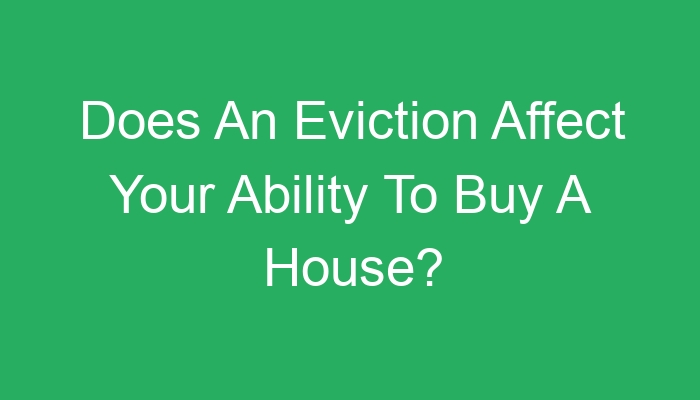An eviction can be a frightening experience for any tenant. Not only does it mean the tenant has to move out of the residence, but it can also have implications for their future when it comes to renting or buying property.
If you are in the process of looking for a new home and are wondering if an eviction will affect your ability to buy a house – the short answer is yes. In this blog post, we’ll explore how evictions affect you financially, what steps you should take if you’ve already been evicted, and other tips to help you find the perfect home. Read on to learn more!
What is an eviction?
An eviction is a legal process in which a landlord forcibly removes a tenant from a rental property. Evictions are typically reserved for tenants who have breached their lease agreement, such as by failing to pay rent or damaging the property. In some cases, landlords may also evict tenants for illegal activity, such as drug use or dealing.
How does an eviction affect your ability to buy a house?
An eviction can have a major impact on your ability to buy a house. If you have been evicted from your home, it will likely be difficult to find another lender who is willing to give you a mortgage. Even if you are able to find another lender, the interest rates and terms of the loan may be less favorable than if you had not been evicted. Additionally, an eviction can stay on your credit report for up to seven years, making it more difficult to qualify for a loan and potentially resulting in a higher interest rate.
The pros and cons of buying a house after an eviction
An eviction can have a major impact on your ability to buy a house. On the one hand, an eviction can be seen as a black mark on your rental history and make it difficult to find another place to live. On the other hand, an eviction can give you the opportunity to buy a house of your own.
If you are facing eviction, it is important to weigh the pros and cons of buying a house before making a decision. The following are some things to consider:
The Pros:
-Owning your own home can provide stability and security that renting may not.
-If you have good credit, you may be able to get a mortgage with favorable terms.
-You may be able to use equity from your home as collateral for other investments or loans.
-Your monthly payments will go towards building equity in your home, rather than paying someone else’s mortgage.
-You may be eligible for certain tax breaks when you own your home.
The Cons:
-Buying a house is a big financial commitment and requires careful planning and budgeting.
-If you have bad credit, you may not be able to get approved for a mortgage or you may end up with unfavorable loan terms. This could lead to foreclosure if you’re unable to make your payments.
-The housing market is unpredictable, so there’s no guarantee that your home will appreciate in value.
Alternatives to buying a house after an eviction
When it comes to eviction, there are a few different ways that things can play out. In some cases, the court may rule in favor of the landlord and order the tenant to vacate the premises within a certain number of days. In other cases, the court may give the tenant a grace period to catch up on rent or make necessary repairs before an eviction can take place. And in still other cases, the court may deny the eviction altogether.
If you find yourself facing eviction, it does not necessarily mean that you will not be able to purchase a home in the future. There are a few different alternatives to buying a house after an eviction that you may want to consider:
1. Renting: You may be able to find a rental property that is willing to overlook your past eviction on your credit report. This is often easier said than done, but it is worth looking into if purchasing a home is your ultimate goal.
2. Government programs: There are several government programs designed to help people with past evictions get back on their feet and into affordable housing. These programs can vary from state to state, so be sure to do your research and see what options are available to you.
Conclusion
An eviction on your record can make the process of buying a house much more difficult. However, it is possible to purchase a home after an eviction if you take the right steps and have patience. Make sure you pay all outstanding debts, improve your credit score, save for a down payment, and reach out to potential lenders who specialize in helping those with past evictions get approved for financing. With some hard work and dedication, owning your own home may still be within reach!

